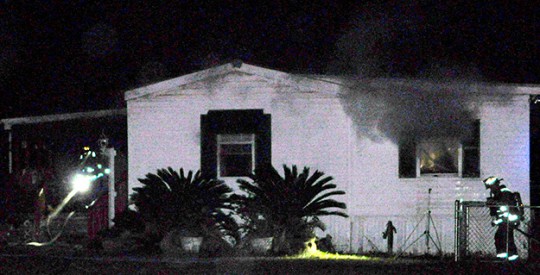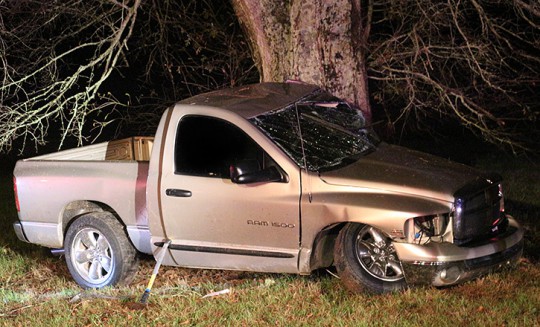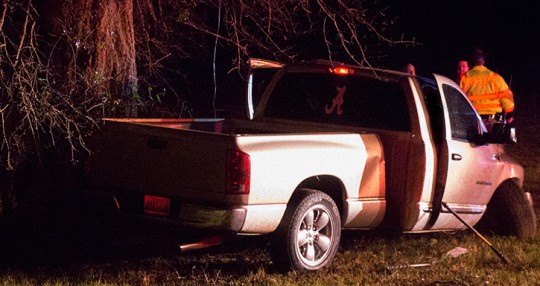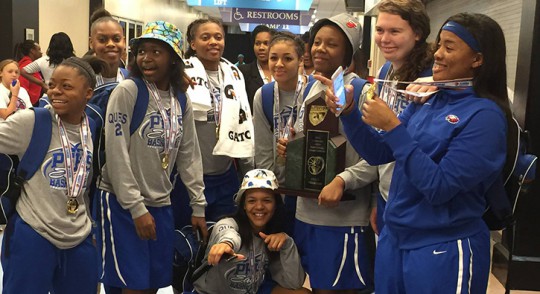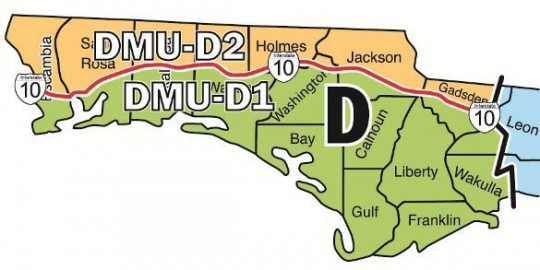Judith Robin Surles
February 23, 2015
Dr. Judith Robin Surles 65, of Atmore, passed away February, 16, 2015, at her residence. She was born August 30, 1949, in Morristown, N.J. but was raised most of her life in Mountain Lakes, N.J. She was a graduate of Life University in Atlanta and had retired from the Health Plus Chiropractic Center in Atmore. She is preceded in death by her parents, Ralph Lawrence and Patricia Sally Walter Harden and a sister, Sally Rae Goordman.
She is survived by her sisters, Laurie Harden (Peter) Andruskiewicz of New Jersey and Kathy Lynn Brew of Maui, Hawaii; special cousins, Larry Rutledge and Donald Rutledge; two nephews, Peter Andruskiewicz and Patrick Andruskiewicz. She loved her cats and dogs very much.
Memorial services will be held Thursday, February 26, 2015, at 5 p.m. from the Johnson-Quimby Funeral Home Chapel with Bro. Cornelius Phillips officiating.
In lieu of flowers donations can be made to the ASPCA in memory of Dr. Judith Robin Surles.
Johnson-Quimby Funeral Home is in charge of arrangements.
Ernest Eugene (Gene) Godwin
February 23, 2015
Mr. Godwin passed away at the William F. Green VA Home in Bay Minette on February 21, 2015. He was born on August 10, 1931, in Byrneville. He was preceded in death by his parents, Archie and Eunice (Wiggins) Godwin; his wife, Myrlene (Stewart) Godwin; his son, Ernest Garry Godwin; and his sister, Flora Vaughn.
Mr. Godwin is survived by his son, Larry (Rebecca) Godwin of Atmore; his daughters, Deborah (David) Ronzone of Bratt and Shelly Godwin of Perlington, MS. Other survivors include six grandchildren; 10 great-grandchildren; and two great-great-grandchildren; and two sisters, Marietta Downer of Bratt and Georgia Avery of Dothan, AL.
Mr. Godwin served in the US Army during the Korean War, achieving the rank of sergeant. Upon completing his military service, he worked for Vanity Fair Mills in Atmore. After 42 years, he retired as Head Machinist.
Mr. Godwin enjoyed special family time riding motorcycles. He also rode with friends and various groups for enjoyment as well as for charitable fundraising events.
For many years and until his death, Mr. Godwin was a member of Trinity Episcopal Church where he had served on the Vestry in the office of Junior Warden. He had also been a member of the American Legion until recent years.
Funeral services will be held at Trinity Episcopal Church on February 24, 2015, at 1 p.m. with Rev. John Phillips of Pensacola officiating.
Immediately after the service, burial will follow at Godwin Cemetery in Bratt.
Pallbearers will be Elliot Classen, Kevin Classen, Shawn Godwin, Robert Earl Godwin, Blaine O’Brien and Roy Ward.
The Women of Trinity Episcopal Church in Atmore are honorary pallbearers.
In lieu of flowers, the family requests memorial donations be made in Mr. Godwin’s honor to Trinity Episcopal Church, 203 S. Carney St., Atmore, AL 36502.
Mr. Godwin’s family will be forever grateful for the excellent care everyone at the Veterans Home in Bay Minette has shown for the past year-and-a-half. The entire staff have all treated Mr. Godwin and his family with dignity and kindness. Particular thanks to everyone who works on G Wing of the facility for their professionalism and compassion. The family is also grateful to Covenant Hospice for keeping Mr. Godwin comfortable in his final days.
Petty-Eastside Chapel Funeral Homes is in charge of all arrangements.
Fire Damages Cantonment Home
February 23, 2015
Fire damaged a mobile home on Green Tree Circle off Jacks Branch Road in Cantonment early morning. The fire was reported just before 4 a.m and quickly brought under control. There were no injuries reported. NorthEscambia.com photo by Kristi Price, click to enlarge.
Highway 29 Molino Accident Claims One Life
February 22, 2015
FOR AN UPDATE TO THIS STORY, CLICK HERE.
One person was killed and a second was seriously injured in a single vehicle crash Saturday night in Molino.
According to the Florida Highway Patrol, 27-year old Darrell Antonio Hixon of Atmore lost control of his Dodge Ram 1500 while traveling south on Highway 29 near Bet Raines Road about 10:30 p.m.. As he changed lanes, he lost control of the pickup, ran off the roadway and struck a tree.
Hixon was transported by Escambia County EMS to Sacred Heart Hospital in Pensacola in serious condition. His passenger was pronounced deceased at the scene. The name of the passenger has not been released by the FHP pending notification of next of kin.
The accident remains under investigation by the Florida Highway Patrol. Any charges in the accident are pending the outcome of that investigation. The Molino and Cantonment stations of Escambia Fire Rescue and the Escambia County Sheriff’s Office also responded to the crash.
NorthEscambia.com photos, click to enlarge.
Rain Chances Continue, Turning Cooler
February 22, 2015
Here is your official North Escambia area forecast:
- Sunday Night A 50 percent chance of rain. Cloudy, with a low around 44. North wind 5 to 15 mph.
- Monday A 40 percent chance of rain. Cloudy, with a high near 49. North wind around 15 mph, with gusts as high as 20 mph.
- Monday Night A 40 percent chance of rain. Mostly cloudy, with a low around 36. North wind 5 to 15 mph.
- Tuesday A 30 percent chance of showers. Mostly cloudy, with a high near 48. North wind around 5 mph becoming calm in the afternoon.
- Tuesday Night A 40 percent chance of rain. Mostly cloudy, with a low around 40. Calm wind becoming north around 5 mph after midnight.
- Wednesday Rain likely. Mostly cloudy, with a high near 47. North wind 5 to 10 mph. Chance of precipitation is 70%.
- Wednesday Night A 40 percent chance of rain. Mostly cloudy, with a low around 34. North wind around 5 mph.
- Thursday Partly sunny, with a high near 52. North wind around 5 mph.
- Thursday Night Mostly cloudy, with a low around 36.
- Friday A 20 percent chance of showers. Partly sunny, with a high near 55.
- Friday Night A 40 percent chance of showers. Mostly cloudy, with a low around 39.
- Saturday A 40 percent chance of showers and thunderstorms. Mostly cloudy, with a high near 55.
Perfect Season: Pine Forest Lady Eagles Win 6A State Championship
February 22, 2015
The Pine Forest Lady Eagles finished a perfect season Saturday with the state 6A state championship. The Lady Eagles defeated the Barron Collier Cougars at the Lakeland Center, 46-28. Pine Forest ended the season undefeated at 29-0.
The Eagles took a commanding 13-2 lead by the end of first quarter, and they were up 25-11 by the half. Ty’Quandria Purifoy had a game-high 17 points for the Lady Eagles and had four assists. Britney Snowden led the Lady Eagles with 15 points and 14 rebounds. Jymetrea Jones contributed six, Tylan Carfter added four, while Laneisha Jeans and Kimberly Payne had two each for Pine Forest.
Photos courtesy Malcolm Thomas for NorthEscambia.com, click to enlarge.
Pardue Art On Display The Molino Branch Library
February 22, 2015
There’s a special art display at the Molino Branch Library through the end of February.
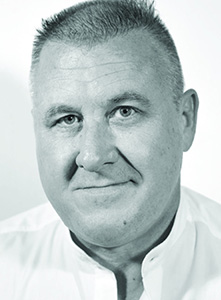 Alan Pardue was born into a family of artists. From the time he could hold a pencil, his grandfather “Papaw” and father were teaching him the basics of art. He paints surrealistic mixed media paintings, as well as sculptures.
Alan Pardue was born into a family of artists. From the time he could hold a pencil, his grandfather “Papaw” and father were teaching him the basics of art. He paints surrealistic mixed media paintings, as well as sculptures.
Pardue has had art shows from Florida to Canada was recently featured in Po10tial Magazine. His art currently can be seen once a month at Pensacola’s Gallery Night. Alan Pardue’s art is also on display at the Molino Branch Library, located at the 6450-A Highway 95A, through February 28.
Courtesy photos for NorthEscambia.com, click to enlarge.
Pathways For Change: Reducing Recidivism, Saving Money
February 22, 2015
This legislative session, Florida’s lawmakers will be asked reconsider how the state deals with criminals. As lawmakers look to reform the system without breaking the budget, one Pensacola nonprofit could offer answers.
 Pathways for Change, which is observing its 10th anniversary this year, estimates that it has saved Escambia County residents an estimated $4.2 million in the last decade – and transformed numerous lives – through its residential treatment program for drug offenders.
Pathways for Change, which is observing its 10th anniversary this year, estimates that it has saved Escambia County residents an estimated $4.2 million in the last decade – and transformed numerous lives – through its residential treatment program for drug offenders.
“We deal with the real problem,” chief operations officer Chris Collins said. “The real problem is addiction, but also things like a lack of education and job training. We take a holistic approach and try to remove every obstacle so they are more likely to become productive citizens.”
Florida Tax Watch, a nonpartisan think tank based in Tallahassee, is one such group. In its annual government efficiency recommendations, released last month, Tax Watch recommended the state invest in building web-based tools that would help judges, prosecutors and others analyze the costs and risks of incarceration compared to other sentencing options. Reform groups have long pointed to such programs as a proven way to reduce recidivism, shrink the state’s prison population and rein in mushrooming costs.
Tax Watch researchers estimated that every one percent reduction in recidivism translates to $8 million in taxpayer savings.
“They’re throwing money at a broken system, only to have a bigger broken system,” Pathways Director Connie Bookman said. “Legislators need to pay attention to reality.
Collins agreed. “The definition of insanity is doing the same thing over and over again and expecting different results,” he said. “The judges in our county see this as a better option than sending a man to prison. I think the introduction of programs like ours throughout the state would help turn the tide of a bloated system.”
FWC: Deer Season Coming To An End
February 22, 2015
Deer hunting season is coming to a close across the Florida Panhandle.
General gun season is open on private lands in our local Zone D through February 22. And then if you don’t mind hunting with a primitive weapon, Zone D’s late muzzleloading gun season runs a week longer until March 1. This unique late season, which occurs only in Zone D, was established to give hunters the chance to hunt the rut, which occurs from mid-January through February in the Florida Panhandle.
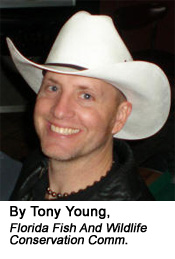 A $5 muzzleloading gun permit is required to hunt during this season, during which, on private land, hunters have the choice of using a muzzleloader, bow or crossbow. Of course, you’ll also need a hunting license, which costs residents $17 for an annual one – or you might opt to purchase the five-year license for only $79.
A $5 muzzleloading gun permit is required to hunt during this season, during which, on private land, hunters have the choice of using a muzzleloader, bow or crossbow. Of course, you’ll also need a hunting license, which costs residents $17 for an annual one – or you might opt to purchase the five-year license for only $79.
On wildlife management areas, this post-season is referred to as the archery/muzzleloading gun season. Hunters can use bows or muzzleloaders, but no crossbows – unless they possess a disabled crossbow permit. Hunters who choose to hunt with a bow must have the $5 archery permit, and those using a muzzleloader need the $5 muzzleloading gun permit.
The most common things to hunt during this season are deer and wild hogs. Only legal bucks may be taken (even if you use a bow), and south of Interstate 10 in newly established Deer Management Unit-D1, one antler must have at least two points. North of I-10 in DMU-D2, all bucks must have at least three points on a side or have a main beam at least 10 inches long to be legal to take.
And if you’re hunting deer, make sure you have the $5 deer permit. On private land, the daily bag limit is two. Season dates, bag limits and antler regulations for deer on WMAs can differ, so consult the area brochure before you hunt.
On private lands, wild hogs can be taken year-round with no bag or size limits. On most WMAs, there also are no bag or size limits, and hogs are legal to take during most hunting seasons except spring turkey. On selected WMAs, specific bag and size limits do apply, so, again, please check the area’s brochure to make sure.
During this season, dogs may not be used to hunt deer. However, you may use a leashed one to track a wounded deer if necessary. And it’s important to note that no turkeys may be taken during this season.
Bows and crossbows must have minimum draw weights of 35 pounds. Hand-held releases on bows are permitted. Broadheads used in taking deer must have at least two sharpened edges with a minimum width of 7/8 inch.
During this late season, the only muzzleloaders allowed are those fired by wheel lock, flintlock, percussion cap or centerfire primer (including 209 primers). Muzzleloaders that can be loaded from the breech are not legal during this time. For hunting deer, muzzleloading rifles must be at least .40-caliber, and muzzleloading shotguns must be 20-gauge or larger.
Legal shooting hours are between a half-hour before sunrise and a half-hour after sunset. You’re allowed to take deer and hogs over feeding stations on private land, but it is illegal to use such feed on WMAs.
Twelve of the WMAs in Zone D have a February archery/muzzleloading gun season, and if you plan to hunt any of them, you must have the $26 management area permit. Those areas are Apalachicola, Apalachicola River, Beaverdam Creek, Blackwater, Chipola River, Choctawhatchee River, Econfina Creek, Escambia River, Perdido River Point Washington, Tate’s Hell and Yellow River.
Florida Gov’t Weekly Roundup: Legislature Gets Moving As Session Approaches
February 22, 2015
After weeks of slogging through introductions, presentations and briefings on the mechanisms of government — the legislative equivalent of “what I did over summer break” reports — lawmakers are following Gov. Rick Scott’s old campaign slogan and getting to work.
Not all the committees have been cooling their heels and hearing about the finer points of funding formulas and organizational charts, of course. But policy discussions that were moving along slowly before this week began taking shape as legislation, and some of that legislation is starting to head toward the House and Senate floors.
 Elsewhere, though, things were slowing down. The Joint Legislative Budget Commission slammed the brakes on subsidies for sports stadiums, something that could have as much to do with bargaining chips as with populist rage over billionaire team owners getting state help for construction or renovation projects. And the battle over whether to split the College of Engineering shared by Florida A&M University and Florida State University ended with an agreement to move forward together.
Elsewhere, though, things were slowing down. The Joint Legislative Budget Commission slammed the brakes on subsidies for sports stadiums, something that could have as much to do with bargaining chips as with populist rage over billionaire team owners getting state help for construction or renovation projects. And the battle over whether to split the College of Engineering shared by Florida A&M University and Florida State University ended with an agreement to move forward together.
Meanwhile, the discussion of what to do about the widespread agreement that Florida students are over-tested finally got started in earnest. At least one state exam is already on the chopping block, and more changes could be on the way. The specifics will have to wait until the legislative session gets underway March 3 — when all the planning of the last week is likely to be overturned in the 60-day whirlwind that follows.
GUNS AND PRISONS
Perhaps the most controversial bill to be heard this week won’t be found on the priority lists of the House speaker, the Senate president or Scott. But it’s on a priority list of a group that might even hold more sway: gun-rights supporters.
The Senate Criminal Justice voted 3-2, on party lines, to allow people with concealed-firearms licenses to carry guns at state colleges and universities. Meanwhile, people without concealed-firearms licenses could carry weapons during emergency evacuation orders, under a separate measure backed by the committee.
But the guns-on-campus bill (SB 176), which would lift a longstanding ban on carrying concealed weapons on campuses, has drawn most of the heat this year.
Committee Chairman Greg Evers, R-Baker, the sponsor of the proposal, displayed a map of sexual offenders living near the Florida State University campus as he called the bill a safety issue.
“The problem is that in gun-free zones, that we have on college campuses right now, those gun-free zones are just an incubator for folks that won’t follow the law,” Evers said.
But Sen. Audrey Gibson, D-Jacksonville, argued that the proposal would allow “mini-militias” to form on the state’s campuses.
“I believe it sends the wrong message to not only our students within the state of Florida, but people who may intend to come to Florida for college,” Gibson said. “It certainly sends the wrong message to their parents.”
While gun-rights groups like to tout their support for law-abiding citizens, the Senate committee is also dealing with how to ensure the safety of Floridians who run afoul of law enforcement. It gave a preliminary nod this week to a corrections overhaul that would make it easier for inmates to file complaints, create new penalties for rogue guards who abuse prisoners and establish a governor-appointed commission to oversee prisons and investigate wrongdoing.
The proposal (SPB 7020), sponsored by Evers, would also allow inmates’ families or lawyers to pay for independent medical evaluations and would expand opportunities for old or sick inmates to get out of prison early.
And the measure would require each prison to track use-of-force incidents and the Department of Corrections to post an annual report documenting those incidents on its website.
Department of Corrections Secretary Julie Jones called the measure, which still has several committee stops before heading to the floor and so far lacks a House companion, a “work in progress” but said she is “cautiously optimistic.”
“Sen. Evers has taken a bold approach to trying to fix the problems that he sees,” Jones said after appearing before the panel on Monday.
The embattled corrections agency is grappling with state probes of questionable inmate deaths, lawsuits from investigators who claim they were retaliated against after exposing a cover-up of the death of an inmate who died at a Panhandle prison and complaints about dangerously low staffing levels at dozens of state-run facilities.
$TADIUM $UB$IDIE$
Last year, lawmakers hoped to create a process that would help them evaluate sports stadium proposals and decide which, if any, might warrant support from sales-tax dollars. The hope was that the process would prevent a gusher of lobbying aimed at putting the projects with the most friends or best advocates at the top of the list.
To borrow a racing term: Gentlemen, start your engines.
The Joint Legislative Budget Commission, comprised of seven senators and seven representatives, agreed this week to move any funding decisions regarding the stadiums — Daytona International Speedway, the Miami Dolphins’ home of Sun Life Stadium, EverBank Field in Jacksonville and a soccer stadium in Orlando — to the regular legislative session.
“I think it’s important that 160 people make decisions of this magnitude, not 14,” said House Appropriations Chairman Richard Corcoran, R-Land O’ Lakes.
The joint commission, which is primarily set up to deal with mid-year budget issues, requires a majority of votes from each chamber’s delegation for a measure to be approved. Corcoran and at least two other House members on the commission were ready to oppose the stadium-funding requests.
Lawmakers last year created a review process to try to reduce the lobbying for stadium-funding proposals. But lobbying efforts increased after the state Department of Economic Opportunity last month forwarded the four applications to the Legislature without providing expected rankings.
Lawmakers have been openly critical about not receiving rankings from the agency and had their own economists later rank the projects.
“When you add up the amount that is being invested (in the projects) in Jacksonville, in Daytona, in Orlando and in Miami you’re talking $1 billion,” said Ron Book, a lobbyist for Sun Life Stadium. “That’s what sports economic development is about. It’s about bringing Super Bowls. It’s about Major League Baseball games, soccer all-star games. It’s about bringing concerts, it’s about bringing full entertainment opportunities to the people of Florida that bring sales-tax revenue in, not only on what is being built on the facilities, but what comes afterwards.”
The commission’s decision disappointed the conservative-advocacy group Americans for Prosperity, which calls stadium funding “corporate welfare.”
“We expected the LBC to take a real stand on this issue,” Chris Hudson, Americans for Prosperity’s Florida director, said in a prepared statement. “Unfortunately the members decided to punt the issue downfield and we will have to wait and see when and how it will come back up throughout session.”
TESTING THE WATERS FOR TEST REFORM
The major action on student testing this week was supposed to take place in the Senate Education Pre-K-12 Committee, where lawmakers on the panel were set to hold a mid-week workshop on legislative solutions to the problem of over-testing.
But almost as soon as committee members had settled in their chairs Wednesday, Scott’s office announced the results of Education Commissioner Pam Stewart’s review of state assessments. Those results could lead to at least one exam getting scuttled and a review of whether more should follow.
Stewart recommended that the state get rid of a language-arts test students take in 11th grade. An exam in the 10th grade is used to determine whether students have met the state’s graduation requirement in language arts, and many educators say the later test is unnecessary.
Stewart recommended that Scott issue an executive order to suspend the test in the current school year, with lawmakers later approving legislation to permanently scrap the assessment.
The report also recommended making optional a college readiness test that some students are required to take and eliminating final exams in courses that have state-mandated tests at the end of the year. Stewart also urged local school districts to do what they can to lower the amount of time students spend on tests.
“I am recommending that we eliminate as much testing as we can,” Stewart told reporters after brief remarks before the Senate Education Pre-K-12 Committee.
But Committee Chairman John Legg, R-Lutz, would not commit Wednesday to getting rid of the 11th grade test in language arts.
“It’s one of the items on the table,” Legg said. “We are reviewing that. … It’s one of those options that we are seriously looking at.”
Other issues still loom. Education groups largely agree that the state should hold off on assigning school grades and making decisions about whether students should be promoted from the third grade or allowed to graduate based on new tests the state is introducing this year. A similar test has caused a backlash in Utah, though Legg said he still has confidence in the exam.
Lawmakers have already ensured that schools won’t face consequences from this year’s results under the state accountability system. But supporters of pushing back some of the other ways the results are used say that’s not enough.
Later in the week, one of the big education controversies of last year’s session finally drew to a close. Following an agreement between Florida State University and Florida A&M University, the state Board of Governors on Thursday approved a new structure for the Tallahassee schools’ joint College of Engineering and seemingly put to rest a months-long battle over the future of the program.
Under the plan, a 12-member board comprised of high-ranking officials and students from both schools would be created to oversee the college, though three of the members — including the two student members — would not have votes. The Board of Governors, which oversees the university system, is also requesting that the Legislature fund the College of Engineering separately, instead of doing so through FSU and FAMU, and a plan to upgrade the schools facilities will be developed.
STORY OF THE WEEK: The Joint Legislative Budget Commission deferred action on a much-watched set of proposals to subsidize sports-stadium construction and renovation projects.
QUOTE OF THE WEEK: “The plain truth is that campuses are not safe. They are gun-free zones where murderers, rapists, terrorists, crazies may commit crime without fear of being harmed by their victims.”—National Rifle Association lobbyist Marion Hammer, on a bill that would allow Floridians with concealed-firearms licenses to carry guns at state colleges and universities.
by Brandon Larrabee, The News Service of Florida


